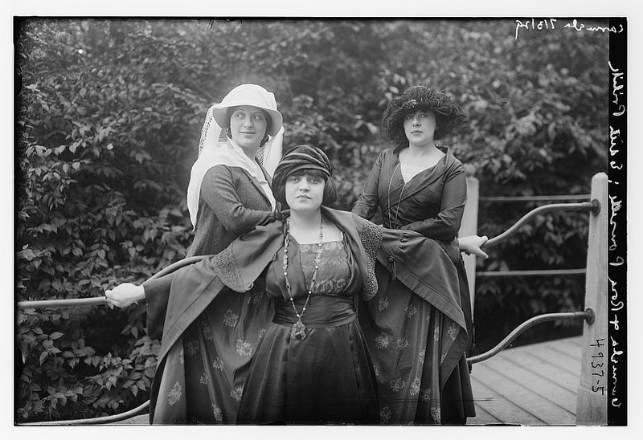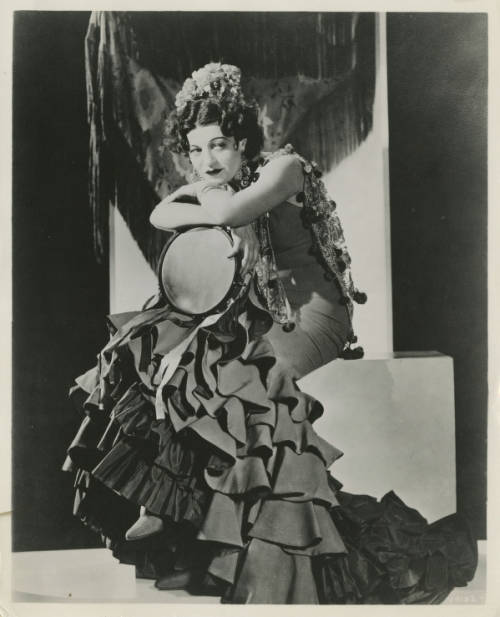|
SATURDEE OPRY LINKS 59: Rosa
Ponselle Special
 
Rosa Ponselle with sister Carmela, and secretary, Edith Prilik.
Ponselle as "Carmen."
Saturdee Opry Links Overture
"I Due Foscari," by Verdi.
https://www.youtube.com/watch?v=YR09DAuF1bQ
1.
Rosa Ponselle apparently barely had any voice training! One story has it that
Caruso heard her singing in Vaudeville, and insisted that the Metropolitan Opera
hire her. When she auditioned, singing "Casta Diva" from Bellin's "Norma" for
the Met general manager, she. . .fainted. Fell over, right there on stage, in
the second half of the aria---so strenuous and stressful was the task. Still,
the first half was compelling enough, and she was hired. Here she is with the
cavatina (precede) and haunting aria, "Casta Diva," from Bellini's "Norma." Aria
starts at 1:50. Get this: before she would attempt to sing her role in Norma,
she insisted that the pitch of the Met would be reduced from A=440 to A=435. The
difference is a seemingly inconsequential fifth of a semitone, yet her wish was
law.
https://www.youtube.com/watch?v=isoGu7utEBI
Role: Norma, High Priestess of the Druid Temple of Esus
Synopsis: The Druids have come to meet with Norma, their high priestess. They
want to revolt against their Roman oppressors but Norma convinces them that
their time to rise up has not come yet. The Romans will be defeated by their own
failings. Norma then invokes the moon and prays for peace. While the chorus of
Druids sings their derison for the Romans, Norma sings her cabaletta, privately
worrying that that the hatred for the Romans must also translate to hatred for
Pollione, her secret Roman lover.
Translation:
http://www.aria-database.com/search.php?individualAria=356
2.
Ponselle was born in Meriden, Conn., on Jan. 22, 1897, the daughter of a baker
and grocery-store proprietor who had emigrated from Naples. She had enough piano
lessons to get hired to accompany silent movies (!). Her minimally trained,
natural voice was comfortable at high C or the rich depths of contralto. Quite
the rarity. Here she showcases her range with the moody, alluring "Tacea la
notte placida" from Verdi's "Il Trovatore."
https://www.youtube.com/watch?v=sewWzy-ePbM
Role: Leonora, a lady-in-waiting for the Princess of Aragon, 1409.
Synopsis: Leonora reveals to her servant Ines that she heard someone serenading
her in the garden. However, when she goes out to see who the troubadour is, she
finds that it is, in fact, a knight in black armor who she had once crowned as
the champion of a tournament. She quickly fell in love with him.
Translation:
http://www.aria-database.com/search.php?individualAria=506
3.
Ponselle had, her NYT obit noted, "coloratura flexibility, a splendid trill,
powerful fortes, delicate pianissimos and precise intonation." Further, "she was
handsome on stage and invested her interpretations with emotion." (I should hope
so!) These qualities are fully in evidence in this recording from Verdi's "Il
Trovatore" ("The Troubadour") of the lovely, delicate "D'amor sull'ali rosee"
("On the rosy wings of love"), all the way from 99 years ago. With English
subtitles.
https://www.youtube.com/watch?v=vcIo9IBv6ws
Role: Leonora, a lady-in-waiting for the Princess of Aragon
Synopsis: Manrico has been captured in an attempt to save his mother from being
executed and is now being held in prison by the Count of Luna. Leonora has come
to the prison in disguise in order to see him. She hopes that he will be
sustained by her love for him.
Translation:
http://www.aria-database.com/search.php?individualAria=515
4.
During her 19 seasons at the Met, Rosa Ponselle (such a lovely name) sang a
total of 22 dramatic and dramatic-coloratura roles. Her first role, at age 21
(!), was Leonora in Verdi's ''La Forza del Destino,'' a dramatic soprano part
usually reserved for experienced singers whose voices have grown gradually over
the years to requisite richness and size. Not Ponselle and her natural
contralto-to-coloratura range. Here is one of the arias she sang in her debut,
from just a few years later, "Pace Pace Mio Dio," from Verdi's "La Forza del
Destino." The way she shifts from deep purple to bright yellow, so to speak, is
astonishing. This aria has it all: lilting, contoured legato (long melodic
line), dramatic emoting, deep ruminating. What a writer Verdi was!
https://www.youtube.com/watch?v=_hv7JpTYZRc
Role: Leonora, the daughter of the Marquis of Calatrava
Synopsis: Outside the cave where Leonora has come to live out her remaining days
in repentance, she calls for peace from God on her tortured soul. She still
loves Alvaro after all the years of torment. She calls upon God to end her
suffering.
Translation:
http://opera-cat.livejournal.com/18788.html
5.
Here is something special in SOL's tribute to the freakishly gifted Rosa
Ponselle, if that is not too vulgar a description: a duet with young basso
profundo Ezio "Some Enchanted Evening" Pinza. This is the prayer, "La Vergine
degli Angeli," also from Verdi's "La Forza del Destino." A gem, still
glistening, from 1928.
https://www.youtube.com/watch?v=K-kYkReOW4g
Synopsis: A monastery. The great doors of the church open, revealing the high
altar lighted by candles. To the sound of organ music, two lines of monks
proceed down the sides of the choir, carrying lighted tapers. They kneel on each
side of the altar. After them walks Father Guardiano, followed by Leonora
disguised in monk's garb. He then leads her out of the
church, as the monks group themselves around her.
Leonora prostrates herself before him, as he solemnly
extends his arms over her.
Translation:
http://lyricstranslate.com/en/la-vergine-degli-angeli-virgin-angels.html
6.
Ponselle made her final Metropolitan performance on Feb. 15, 1937, in the title
role of Bizet's ''Carmen'' and, it is said, left the house vowing never to set
foot in it again. What went wrong? Was she not right for the part? Whatever the
case, critics were most unkind. Here is a wonderful screen test of Ponselle as
"Carmen," from around the same time. Perhaps not the greatest "Carmen" ever, and
maybe she's past her greatest days, but gee, it seems perfectly fine to these
untrained ears. First Ponselle sings the "gypsy song," "Les tringles des sistres
tintaient," followed by the Habanera, "L'amour est un oiseau rebelle" ("Love is
a rebellious bird.")
https://www.youtube.com/watch?time_continue=6&v=Y_wmjUk234s
Translation, "gypsy song:"
http://www.aria-database.com/translations/carmen07_tringles.txt
Translation, habanera:
http://www.aria-database.com/translations/carmen01_habanera.txt
7.
A three-octave range. Twenty-two roles at the Met, including Oberon, Ernani, Don
Carlos, La Gioconda, William Tell, Don Giovanni, La Traviata, Norma. . .And
sixteen years after her Met career, her voice, though obviously well past its
greatness, was still captivating. Here is a remarkable home recording from 1953
of Ponselle singing the tender, almost hypnotic "Mon cœur s'ouvre à ta voix"
from Saint-Saens' "Samson and Delilah." Did I say "hypnotic?" Well, the
Philistine priestess is trying to seduce Sam (and urge him to get a haircut.)
Turns out that Ponselle recorded a number of arias by Bizet, Cilea, Saint-Saens,
Puccini, Wagner(!) at this time---of roles she wished she had sung on stage.
https://www.youtube.com/watch?v=JDT-egJ9iEM
Setting: the valley of Soreck, ancient Palestine
Synopsis: In an attempt to close the trap which she has set for Samson, Dalila
tells Samson seductively that she will surrender herself entirely to him if he
wants her. She begs him to respond to her caresses, hoping that he will finally
forget about the Israelite rebellion he is leading against the Philistines. If
Samson concentrates completely on her, the High Priest of Dagon may be able to
capture him.
Translation:
http://www.aria-database.com/search.php?individualAria=916
SPOTLIGHT:
Why didn't Ponselle ever sing Puccini? Let’s ask her.
https://www.youtube.com/watch?v=ChiAEpHhQqI
8.
Rosa's older sister, Carmela, was the first to sing on stage, performing on
Broadway in the musical, "The Girl from Brighton." Rosa followed and soon the
pair sang together in Vaudeville as "The Ponzillo Sisters, Those Tailored
Italian Girls." Here is a recording of the sisters, made later, after Rosa's
operatic success, of the Barcarole from "The Tales of Hoffman," by Offenbach. In
English.
https://www.youtube.com/watch?v=OFnclg2OwCk
About the duet, translation:
https://en.wikipedia.org/…/Belle_nuit,_%C3%B4_nuit_d%27amour
9.
Ponselle did sing Puccini, if only on record, but for that we should be
grateful. To think of her chesty, contralto-shaded voice in a Puccini "waif"
might seem incongruous until you remember how she was almost a split vocal
personality, able to control high notes so adroitly---as well as her skills at
projecting emotion. Here she is from 1919 with "Visi d'arte," "I lived for art,"
from "Tosca." With English subtitles.
https://www.youtube.com/watch?v=GheszdYdArs
Synopsis: Tosca, having been blackmailed into promising sex to the fiendish
Weinstein, I mean Scarpia, in exchange for the life of her beloved Cavaradossi,
laments her fate.
Translation:
http://www.aria-database.com/search.php?individualAria=302
FINAL BOW:
The great Rosa Ponselle was buried beside her beloved sister, Carmela, in
Pikesville, Md. at Druid Ridge Cemetery. The Ponzillo Sisters, reunited. Here
she sings the great Tosti song, "Goodbye," on radio, Dec. 3, 1934.
https://www.youtube.com/watch?v=legkEvHVFPg
Translation:
http://www.lieder.net/lieder/get_text.html?TextId=17443
Saturdee Opry Links ENCORE!
"What a lovely thing is a sunny day!"
The Ponselle Sisters sing "O Sole Mio."
Sta nfronte a te!
https://www.youtube.com/watch?v=cKQ57UW6nhw
About, translation:
https://en.wikipedia.org/wiki/%E2%80%99O_sole_mio
Back to Opera Links
Back to Home Page
|



